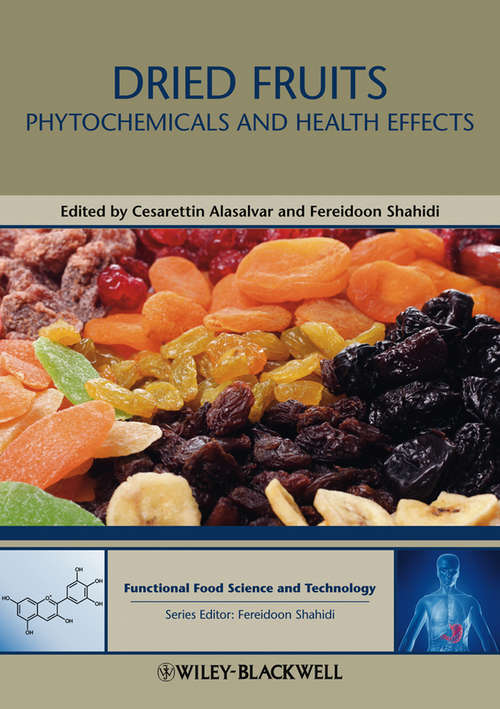Dried Fruits: Phytochemicals and Health Effects (Hui: Food Science and Technology #8)
By:
Sign Up Now!
Already a Member? Log In
You must be logged into Bookshare to access this title.
Learn about membership options,
or view our freely available titles.
- Synopsis
- Dried fruits serve as important healthful snack items around the world. They provide a concentrated form of fresh fruits, prepared by different drying techniques. With their unique combination of taste/aroma, essential nutrients, fibre, and phytochemicals or bioactive compounds, dried fruits are convenient for healthy eating and can bridge the gap between recommended intake of fruits and actual consumption. Dried fruits are nutritionally equivalent to fresh fruits, in smaller serving sizes, in the current dietary recommendations of various countries. Scientific evidence suggests that individuals who regularly consume generous amounts of dried fruits have lower rates of cardiovascular disease, obesity, various types of cancer, type-2 diabetes, and other chronic diseases. Dried fruits also have the advantage of being easy to store and distribute, available around the year, readily incorporated into other foods and recipes, and present a healthy alternative to salty or sugary snacks. Dried Fruits: Phytochemicals and Health Effects is divided into three sections preceded by introductory chapters that provide an overview of dried fruits (their composition, phytochemicals and health applications) as well as the cancer chemopreventive effects of selected dried fruits (amla fruits or Indian gooseberries, avocados, berries, mangoes, mangosteens, persimmons, prunes, raisins, kiwi fruits, and other dried fruits). The first section covers the most popular dried berries (blackberries, blackcurrants, blueberries, cranberries, goji berries, mulberries, raspberries, and strawberries); the second section discusses non-tropical dried fruits (apples, apricots, cherries, citrus fruits, figs, nectarines, peaches, pears, prunes, and raisins); and the final section addresses tropical dried fruits (açai fruits, bananas, dates, guavas, papayas, mangoes, passion fruits, and pineapples). Contributors to this volume are internationally renowned researchers who have provided a comprehensive account of the global perspectives of the issues relating to phytochemicals and health effects of dried fruits. The book will serve as a resource for those interested in the potential application of new developments in dried fruits’ nutraceuticals and functional foods. Biochemists, chemists, food scientists/technologists, nutritionists, and health professionals, from academia, government laboratories, and industry will benefit from this publication. Although this book is intended primarily as a reference book, it also summarises the current state of knowledge in key research areas and contains ideas for future work. In addition, it provides easy to read text suitable for teaching senior undergraduate and post-graduate students.
- Copyright:
- 2012
Book Details
- Book Quality:
- Publisher Quality
- ISBN-13:
- 9781118464649
- Related ISBNs:
- 9781118464663, 9780813811734
- Publisher:
- Wiley
- Date of Addition:
- 04/08/20
- Copyrighted By:
- John Wiley & Sons
- Adult content:
- No
- Language:
- English
- Has Image Descriptions:
- No
- Categories:
- Nonfiction, Technology
- Submitted By:
- Bookshare Staff
- Usage Restrictions:
- This is a copyrighted book.
- Edited by:
- Cesarettin Alasalvar
